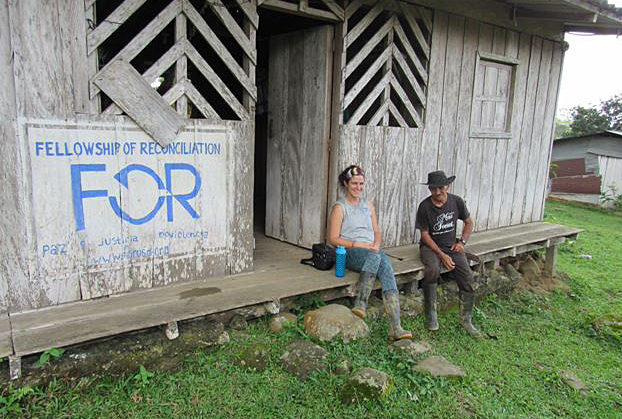FORPP accompanier Kati Hinman reflects on her childhood growing up in Norfolk, a small town in the U.S. Today, she accompanies in the Peace Community in a far-flung, small Colombian village. She reflects on how small town USA meets rural Colombia.

Originally published in Norfolk Now
Since moving away from Norfolk, I´ve always been proud of my small town background. I can’t count the number of times people have asked “did you say twelve HUNDRED!” or “but how can you not have a grocery store?” When I moved abroad, first to the Dominican Republic and now to Colombia, I was excited to live again in a rural area. I´m reassured by the constant flow of children playing tag, neighbors offering us milk and eggs, and even the gossip, though I try hard to avoid being the center of it.
Living in rural Colombia has been an adjustment. Some things I was already prepared for through my other experiences abroad (hand-washing clothes is something I could safely put on my resume now, if any future employer cares). I live and work with the Peace Community of San José de Apartadó, a collective of over 500 peasant farmers in the Urabá region, located in a rural area in northern Colombia.
My role in the community as an international observer is to accompany the people of the village and witness what is happening. It is a very remote area, and to get to my house we either have to hike an hour and a half or take mules. Often we travel to nearby villages that are another five hours by mule.
Most people here work as farmers, growing crops such as beans, rice, yucca, avocados and chocolate. The most impossible adjustment for me, however, is realizing how normalized violence is for the people who live here. The Peace Community has lost over 300 people in the 20 years it has endured the conflict with guerilla groups within the country, while its membership during that time has been at most 1,000 people. This is a tight-knit community. Everyone here has lost a family member, a partner, a close friend or even a child to the violence, which is driven by forces beyond the community’s control.
Members repeatedly affirm their simple wish to farm their land, raise their children and just live their lives in peace. But because of its strategic location close to the Pacific coast and the border with Panama, as well as its resource-rich land, the area is constantly caught in the crossfire of armed groups, drug trafficking, and multi-national companies looking to farm and mine on a massive scale. For the residents, this means that, woven into their funny anecdotes and love stories, are tales of nights spent waiting for the gunfire to stop and for someone to come home, of terrified flights when they were told to displace or die and tales of loss that never get easier, no matter how often it is experienced.
What I admire most about the people of San José de Apartadó is their commitment to honor the past and push forward together in the spirit of community. Every year on Good Friday, they do a hike for the Stations of the Cross to the various spots where community members have died. I and a co-worker accompanied them this year on the 12-hour hike, which was interspersed with banana breaks. At each station the people shared a Bible story and a story of one of their own martyrs as a reminder that they must continue to resist violence as a community in memory of all those who have lost their lives.
We were also invited to participate in the walk by sharing the biblical story of Veronica, the woman who stepped forward to wipe Christ´s face as He was carrying the cross. While she cannot stop what is happening to Him, she does not look away, as many others do. Instead she offers Him a small gesture of support.
The story of Veronica is a reminder that we have the responsibility to deal with suffering, even when it is not our own. I think this happens in a lot of ways. Veronica´s gesture is not grand or complicated. She is merely showing that she cares and acknowledges Christ’s pain. While I cannot imagine growing up surrounded by so much pain and violence, the way people here care for each other has made me reflect on all the ways we find to reach out to those around us, especially in small communities. I think about my parents volunteering with the fire department or ambulance, sharing joys and concerns at church services and helping a neighbor shovel snow from her driveway. These small acts of neighborly kindness are why so many of us love Norfolk.
Similarly, the most rewarding part of my time in Colombia is being able to share in the fabric of daily life within this close community. For example, we like to keep an extra pot of coffee on the stove, because people have a custom of walking into our kitchen unannounced. It’s a practice I saw in my own household growing up. These sorts of habits of caring for neighbors that I learned in Norfolk have stayed with me, though I’ve expanded my understanding of who my neighbors are.

